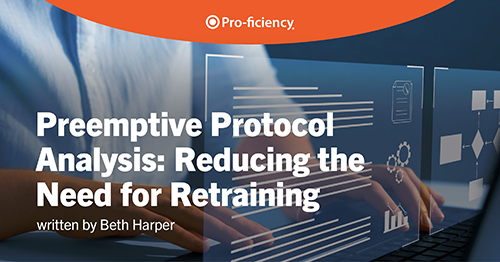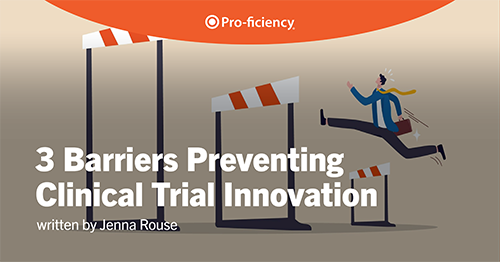Preemptive Protocol Analysis: Reducing the Need for Retraining
When things go wrong during a clinical trial, retraining of staff is often the go-to response to correct the problem. But rather than using training as a band-aid for every protocol deviation that occurs, organizations would be better served by investing up-front in protocol analysis to anticipate areas where protocol deviations or other problems are likely to occur, and then designing training that will trouble-shoot those issues in advance.
While staff retraining is the knee-jerk reaction to a protocol deviation or problem, training is not always the root problem. There could be issues with a site’s operational process, technology or communication, among other things.
If done properly, training can be designed that anticipates these potential problems and focuses its efforts on ensuring that challenging parts of a protocol are fully understood. This depends upon a thorough protocol review, with specific input from patients and research sites to identify anything that is unclear or impractical.
This information can then be used both to refine the protocol into something difficult to misinterpret and to develop a training program that truly meets site’s needs, along with job aids where it makes sense to support research staff in making the correct decisions with every patient and every procedure.
Correcting protocol deviations can be a costly and time-consuming process that leads to study delays, extra costs and potential impact on study data. And deviations are far from uncommon. According to a study published by Tufts Center for the Study of Drug Development (CSDD) last year, Phase 2 and 3 protocols have a mean of 75 and 119 protocol deviations, respectively. And the FDA’s most recent BIMO metrics report lists protocol deviations or failure to follow the investigational plan as the most common observations listed on Form 483s after a BIMO inspection.
But deviations aren’t the only issue of concern. Protocol amendments can add significantly to the cost and duration of a clinical trial. CSDD has estimated that a single protocol amendment to a typical Phase 3 protocol can add three months of time and more than $500,000 in cost to a clinical trial, on average.
And amendments are on the rise. CSDD data indicates that the frequency of protocol amendments is increasing. During the 2018-2020 period they increased significantly compared to the 2013-2015 period. Nearly 78% of Phase 2 and 69% of Phase 3 protocols had at least one substantial protocol amendment; total amendments per protocol averaged 2.7 for Phase 2 and 3.3 for Phase 3.
Both protocol deviations and amendments potentially impact patient retention, investigative site commitment and the completeness, accuracy and reliability of study data.
But none of this data means that protocol deviations and amendments are just part of doing business for the clinical research industry. Rather than the traditional reactive response to problems arising during study conduct, sponsors could take a more proactive approach and trouble-shoot problems before a trial even begins.
Communication, analysis, then training
And this does not begin with protocol training. The first step to avoiding deviations and amendments is a thorough analysis to understand what a day in the life of a patient or research site would look like under the protocol.
For instance, many logistical issues can become major pain points for research sites and patients when it comes to putting the written protocol into action. The time window required for drug administration or patient visits is one example. A protocol may provide a window of 10 minutes to administer a drug, but that window may not be workable for all sites. If a particular site has patient visits occurring on one side of a large campus while the research pharmacy is on the other side, for instance, that 10-minute period may be insufficient.
If a drug takes 45 minutes to thaw before being provided to a research nurse to administer, that will add to the time needed to prepare each dose for each patient. Further, if the pharmacy is at a distance from the clinic, the time to deliver that drug also must be considered. Other factors include the time needed for the nurse to prepare the patient and prepare the drug in an infusion bag. The whole process could take well over an hour.
Similarly, the amount of time and effort required to attend visits and otherwise participate in a clinical trial can have a big impact on patient willingness to enroll. Protocols that include lengthy visits for tests and treatment can put patients off, as can lengthy or frequent trips to the clinic. Remote visits may ease some of that resistance for some patients, but not all; some may be unwilling to have strangers coming to their homes.
And on the staff side, long or frequent visits can raise questions about when staff must be available.
In essence, a protocol analysis needs to consider what is practical for patients and for the sites that will be conducting the clinical trial. This sort of analysis requires input from both patient groups and the enrolling sites. While it’s becoming more common for sponsors to include patient advocacy groups input into protocol design, that is just the first step. They also need to get feedback from the sites that will implement the protocol to learn what is and is not operationally feasible.
With that operational input, including what parts of a protocol may be burdensome or impractical for patients and sites, a sponsor can refine its training to fully address any areas that might differ from a site’s normal standard of care or otherwise be open to interpretation.
Solutions such as Pro-ficiency’s Protocol Optimization methodology can be used to get a thorough interpretation of a protocol, identify potential problem areas or pain points and provide a visualization that helps make clear what the journey through a clinical trial will look like for patients and research sites.
The mapping out of tasks and timelines in the protocol is especially important. Without that visualization, it is easy to miss all the steps that have to happen with each procedure or patient visit. It also helps to uncover any inconsistencies that might exist in the protocol. A visual mapping of a study’s operational flow, on the other hand, will easily reveal any issues.
If that process flow is animated, as provided by Pro-ficiency’s Protocol Optimization solution, it can become even more clear. In essence, a sponsor can see in a few minutes the whole of the study experience for the sites and patients in a way that will have a visceral impact and better enable both refinement of the protocol and development of effective training.
By approaching protocol optimization in this way, sponsors can ensure that training reflects perfectly the experiences research staff will have in implementing a given protocol.
And this effect can be expanded by incorporating simulation-based training. Any novel or unusual procedures can be more carefully illustrated and explained to avoid misinterpretation; job aids can also be provided to guide researchers’ decision-making in real time. The training can likewise walk researchers through not only the steps, but the timelines needed to complete patient visits and other key tasks.
Training, in this way, becomes a tool for proactive troubleshooting, reducing the need for after-the-fact procedures to address protocol deviations.
To learn more, visit our Pro-Active Protocol webpage: https://www.pro-ficiency.com/protocol-optimization/

Beth Harper, Chief Learning Officer at Pro-ficiency, is on a mission to eliminate protocol deviations. Beth brings 35-plus years of experience in clinical research operations to Pro-ficiency, utilizing this knowledge along with her years of creating live protocol simulation training to create cutting-edge simulation training programs at Pro-ficiency. Beth has published and presented extensively in the areas of study feasibility, site selection, patient recruitment, protocol optimization, sponsor/site relationship management and clinical research professional competencies. Beth received her B. S. in Occupational Therapy from the University of Wisconsin and an M.B.A. from the University of Texas.
















